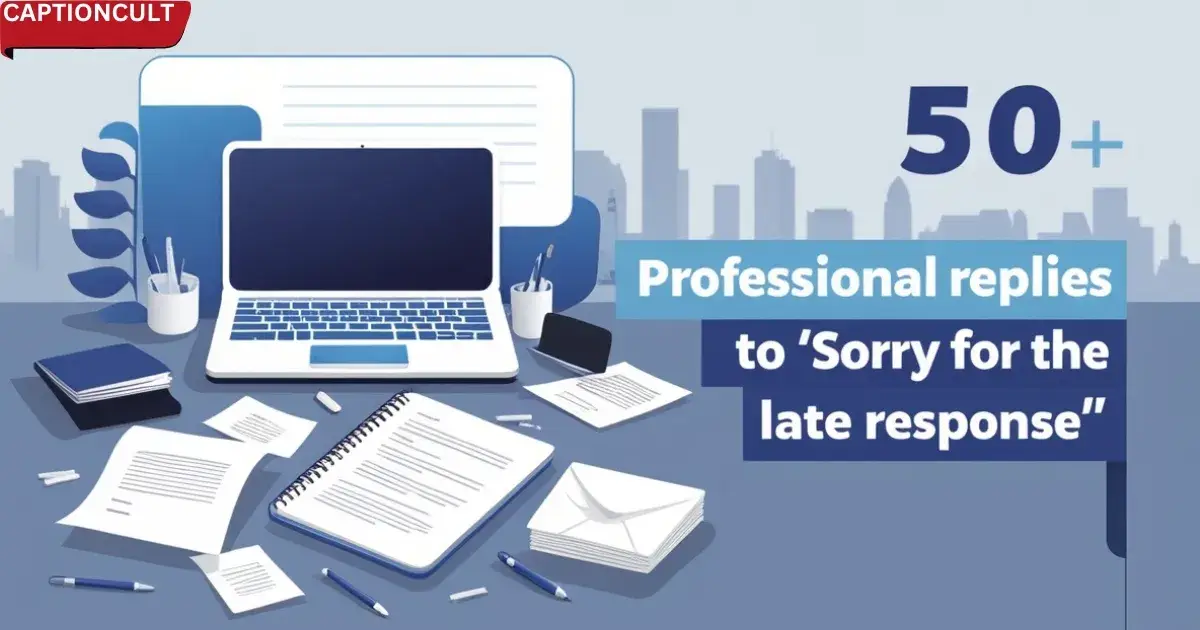In our fast-paced world, it’s easy for messages and emails to get buried under piles of tasks, deadlines, and other responsibilities. We’ve all been there—delaying a response due to a busy schedule, and then feeling the need to apologize for the sorry for late response. Whether it’s a client, a colleague, or a customer, you want to maintain professionalism and courtesy in your communication, even when a reply comes later than expected.
Responding to sorry for the late reply can be a tricky situation. You don’t want to sound robotic or overly formal, but you also want to maintain professionalism. The right response can show empathy, keep the conversation moving forward, and strengthen your working relationships. In this article, we’ll explore over 50 creative, professional, and courteous ways to respond to sorry for late response, along with tips and examples to ensure your communication remains respectful, clear, and action-oriented.
Why Does Your Reply Matter?
When someone apologizes for a late reply, it’s an acknowledgment of their tardiness, but it’s also an opportunity to demonstrate professionalism and empathy. A well-thought-out reply can diffuse any awkwardness, keep the conversation on track, and help maintain positive relationships. Whether in business email exchange, client interaction, team collaboration, or customer service, your response can influence how others perceive your communication style.
When to Respond and How?
In some cases, the ideal response is a simple acknowledgment, like “No worries!” In others, you may need to take a more professional approach, especially if you’re dealing with clients, customers, or colleagues who rely on timely responses. Here’s where action-oriented replies and gracious professional responses come in handy. By combining empathy with actionable steps, you can keep the conversation productive and show respect for the sender’s time.
Business Email Exchange: Polite and Professional
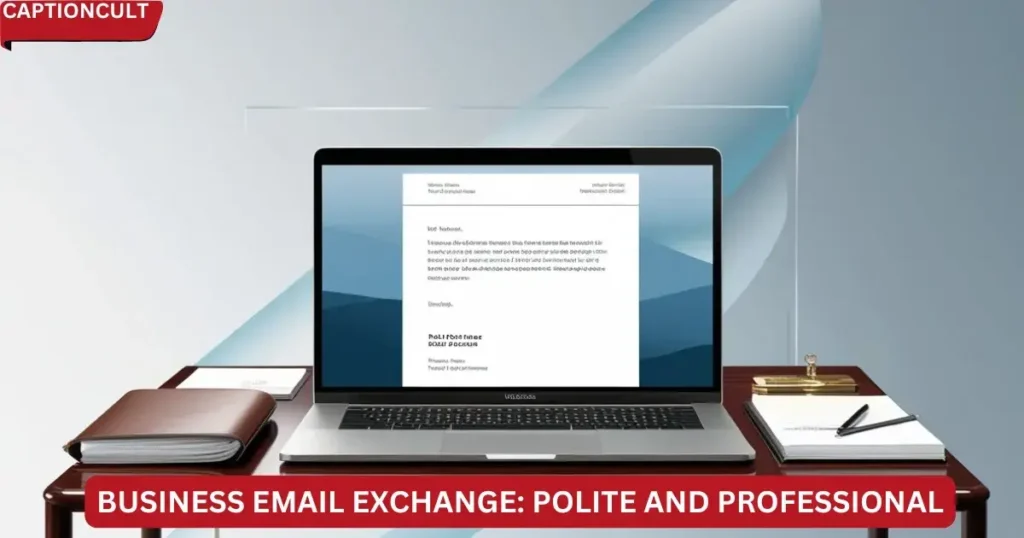
In a business context, your response must reflect professionalism, even when the other person apologizes for a delayed response. Here are several examples you can use:
- “No problem at all! I appreciate your response and am happy to move forward.”
- Context: Acknowledging the delay without dwelling on it, focusing instead on the task at hand.
- “Thank you for letting me know. I completely understand and appreciate the update.”
- Context: Emphasizing your understanding of busy schedules while maintaining politeness.
- “Thanks for your patience. Let’s continue with the next steps!”
- Context: A great way to acknowledge the late reply and shift the conversation into action.
- “I understand that things can get busy. Let’s get back on track.”
- Context: Acknowledging the delay in a friendly, understanding way while keeping the conversation professional.
Client Interaction: Courteous and Understanding
In client communication, your goal is to maintain trust and professionalism while showing empathy. Here’s how you can respond to sorry for late response:
- “Thank you for your patience. I’m here to assist you with your concerns now.”
- Context: Professional and reassuring, showing your readiness to help.
- “I completely understand, and I appreciate your understanding. Let’s move forward.”
- Context: Empathetic and forward-focused, emphasizing that the past delay is behind you.
- “I apologize for the delay as well. Thank you for your continued trust in our services.”
- Context: Apologizing for the delay while thanking the client for their patience.
- “I appreciate your understanding. How can we move forward with this issue?”
- Context: Encouraging action while acknowledging the delay in a respectful manner.
Team Collaboration: Friendly Yet Professional
When responding to colleagues or team members, it’s important to balance professionalism with a bit of informality. Here are some suggestions:
- “Thanks for your patience! Let’s catch up on where we left off.”
- Context: A light-hearted, friendly response that keeps the conversation going.
- “Apologies for the late response. I’ve been catching up with other tasks, but I’m here now.”
- Context: Acknowledging your busy schedule while expressing readiness to collaborate.
- “Thanks for waiting. I’m now available to discuss the details.”
- Context: A simple, action-oriented reply that acknowledges the delay without making it the focal point.
- “Sorry for the late reply! Let’s get this wrapped up.”
- Context: Casual yet professional, this keeps the energy positive while addressing the delay.
Customer Service Interaction: Patient and Solution-Oriented
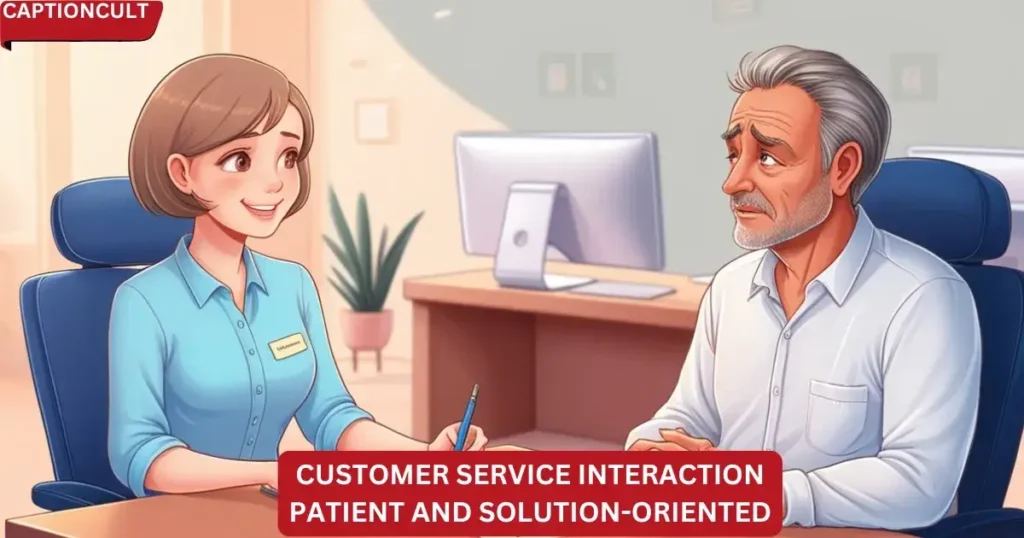
In customer service interaction, responding to a delayed message requires a balance of empathy and a clear plan to resolve any issues. Try these approaches:
- “Thank you for your patience. How can I assist you with this now?”
- Context: Acknowledging the delay while focusing on providing help and moving forward.
- “Apologies for the delay in response. We are committed to resolving this matter for you.”
- Context: Professional, reassuring, and solution-focused, reinforcing the commitment to customer satisfaction.
- “Sorry for the wait! I’m here to help. Let’s get this sorted out for you.”
- Context: Friendly and action-oriented, aiming to resolve the issue promptly.
- “Thanks for bearing with us. Let’s go over the next steps together.”
- Context: Showing appreciation while moving the conversation towards actionable steps.
Networking or Professional Outreach: Polite and Engaging
Networking is about building relationships, and how you handle delays in communication can affect future opportunities. Here are some professional replies to consider:
- “Thank you for your reply! It’s great to hear from you.”
- Context: Acknowledging the delay in a light and friendly manner, making the recipient feel valued.
- “Apologies for the late response. I’d love to discuss how we can collaborate.”
- Context: Acknowledging the delay while redirecting the conversation towards a positive and forward-moving discussion.
- “No worries about the delay! I’m excited to connect and explore potential opportunities.”
- Context: Reassuring and warm, this response ensures the connection stays strong despite the delay.
- “Thanks for reaching out! I understand things get busy; let’s pick up where we left off.”
- Context: A polite way to acknowledge the delay and move the conversation forward.
Action-Oriented Replies to Just Move Forward
Sometimes, it’s important to move past the apology and get to the point. These action-oriented responses help keep things productive:
- “Thanks for letting me know. Let’s continue with the next steps.”
- Context: Focuses on the task at hand rather than the apology.
- “No problem. I’ve reviewed the information, and here’s what we can do next.”
- Context: Shifts the focus to solutions, providing clarity and direction.
- “I appreciate your response. Let’s dive into the details now.”
- Context: Acknowledge the delay, but quickly transition to action.
- “Thanks for the update! Here’s how we can proceed.”
- Context: A polite, action-oriented reply that focuses on progress.
Sorry for Late Response Text
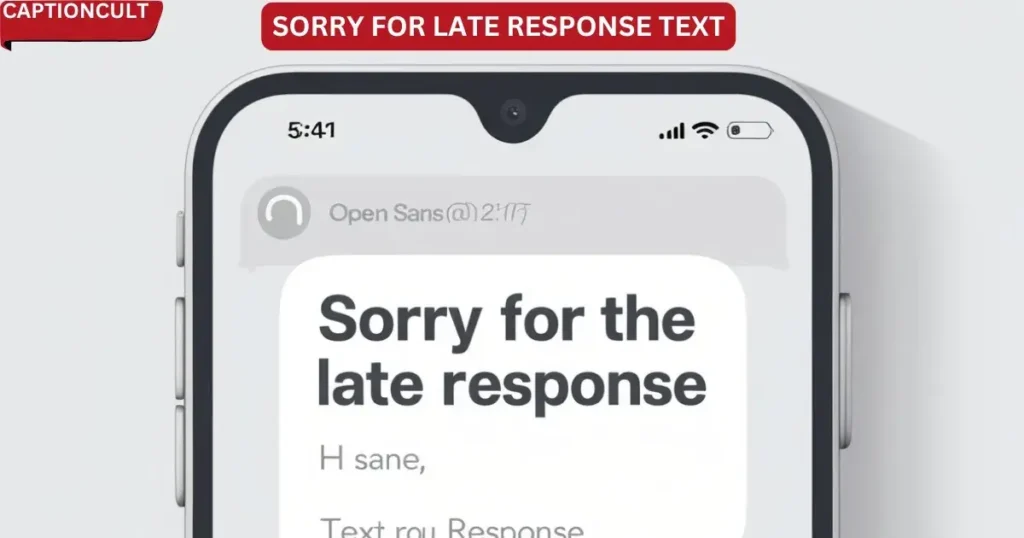
- “Sorry for the late text response! Things have been pretty hectic, but I’m free now. Let’s talk!”
- “Apologies for the delayed response! I’ve been busy, but I’m finally getting back to you. What’s new?”
- “Sorry I didn’t reply sooner! I was swamped with work. Let me know what’s up!”
10 Things to Say Instead of ‘Sorry for the Late Response’
If you want to avoid overusing “sorry for the late response,” here are some alternative responses:
- “Thank you for your patience, I’m catching up now!”
- “Thanks for waiting, let’s move forward with this.”
- “I appreciate your understanding while I caught up.”
- “I’ve been busy, but I’m glad to be in touch now.”
- “Thank you for your patience; I’m happy to continue this conversation.”
- “I’ve just reviewed your message, let’s move on!”
- “I appreciate your patience, let’s discuss the next steps.”
- “Thank you for your understanding, let’s move ahead.”
- “Thanks for your patience while I got back to you.”
- “I’m here now—let’s get started!”
Sorry for Late Response Message
- “Apologies for the late response! I’ve been tied up with a few things, but I’m here now. What’s up?”
- “Sorry for the delayed reply. I was swamped with work, but I’ve got some time to chat now!”
- “I’m sorry for the late reply—I got a bit caught up. Thanks for waiting!”
Sorry for Late Reply WhatsApp
- “Apologies for the delay in responding on WhatsApp! I was tied up, but I’m free now. What’s up?”
- “Sorry for the late reply, I just got around to catching up with messages. How’ve you been?”
- “Hey! Sorry for the late response here. Things got a little hectic, but I’m back now—what’s going on?”
How to Respond to ‘Sorry for the Late Reply’ Professionally
If someone apologizes to you for a late reply, it’s important to handle it with grace. Here’s how:
- “No problem at all! I understand how things can get busy.”
- “Thanks for letting me know. Let’s continue with our discussion.”
- “It’s perfectly fine! We all have busy schedules. Let’s get back on track.”
- “I completely understand, no worries. Let’s proceed with the next steps.”
Sorry for Late Response to Friend
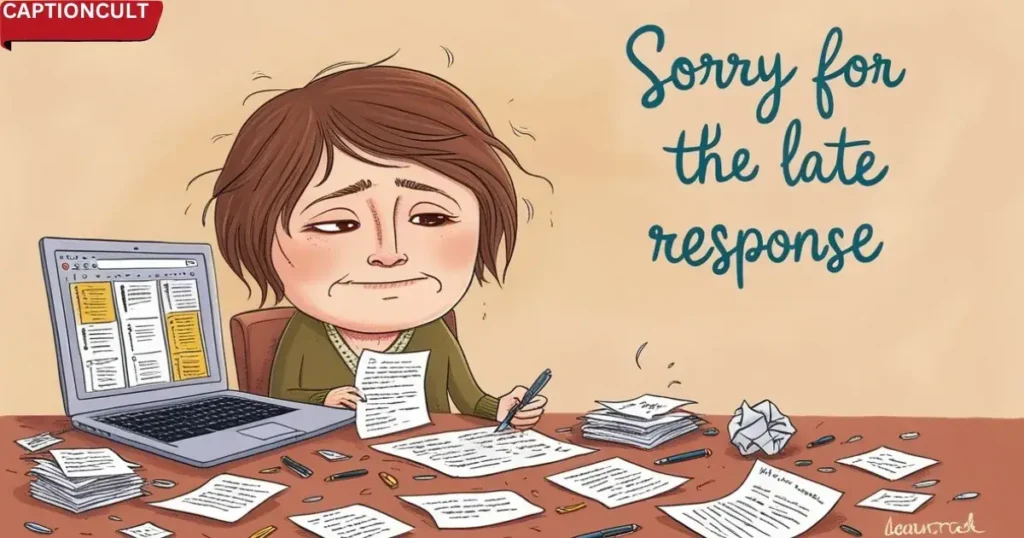
- “Hey, sorry for the delay in getting back to you! It’s been a out of control few days, but I’m here now. How’s everything going?”
- “My bad for the late reply! I’ve been a bit swamped lately, but I’m catching up on messages now. What’s up?”
- “Sorry for taking so long to reply, I’ve been juggling a lot. Let me know how things are going on your end!”
Sorry for the Late Reply, I Was Busy
- “Sorry for the late reply, I’ve been busy with work lately. Let’s catch up now though!”
- “I apologize for the delay, I was caught up with some things. Thanks for your patience!”
- “Sorry, I’ve been super busy recently. I just saw your message—how can I help?”
Tips for Handling Late Responses
When responding to delayed messages, it’s important to be empathetic but also assertive in ensuring the conversation moves forward. Here are some tips:
- Stay Calm: It’s easy to get frustrated when faced with a late reply, but maintaining a calm and understanding tone will help keep things professional.
- Be Gracious: Whether you’re apologizing for a delayed response or acknowledging someone else’s tardiness, always remain courteous and respectful.
- Shift to Action: The most effective responses focus on what can be done next rather than dwelling on the delay.
- Set Expectations for the Future: If delays are frequent, gently set expectations about response times going forward.
Frequently Asked Questions
How to respond to sorry for the late reply professionally?
Acknowledge the delay politely and smoothly transition the conversation to the next point, keeping a positive tone.
How to say sorry for the late reply professionally?
Express understanding of the situation, offer a brief apology, and focus on moving forward with the discussion.
How do you say sorry for a late reply?
Politely apologize for the delay, briefly explain if necessary, and assure the person you’re now ready to proceed.
How do I professionally say “sorry, I’m late”?
You can say, “Apologies for the delay in my response. I appreciate your patience and am ready to continue now.”
What to say instead of “sorry for the delay”?
Consider saying, “Thank you for your patience” or “I appreciate your understanding during this time.”
How do you say sorry for following up again?
You can say, “I apologize for reaching out again, but I wanted to check in on the status of this.”
Final Thoughts
Responding to a sorry for late response message doesn’t have to be awkward or difficult. By choosing your words carefully, you can maintain professionalism, show empathy, and keep the conversation productive. Whether you’re replying to a client, a team member, or a customer, these 50+ replies offer plenty of options to help you navigate any situation with grace.
Remember, it’s not just about acknowledging the delayed response but also about moving forward with clarity and action.

This is a passionate author whose work explores the power of language and storytelling. With a keen eye for detail and a commitment to excellence, Julian believes that every word has the potential to create meaning and beauty. “Where Words Find Perfection” is a reflection of his dedication to crafting narratives that resonate deeply with readers.

